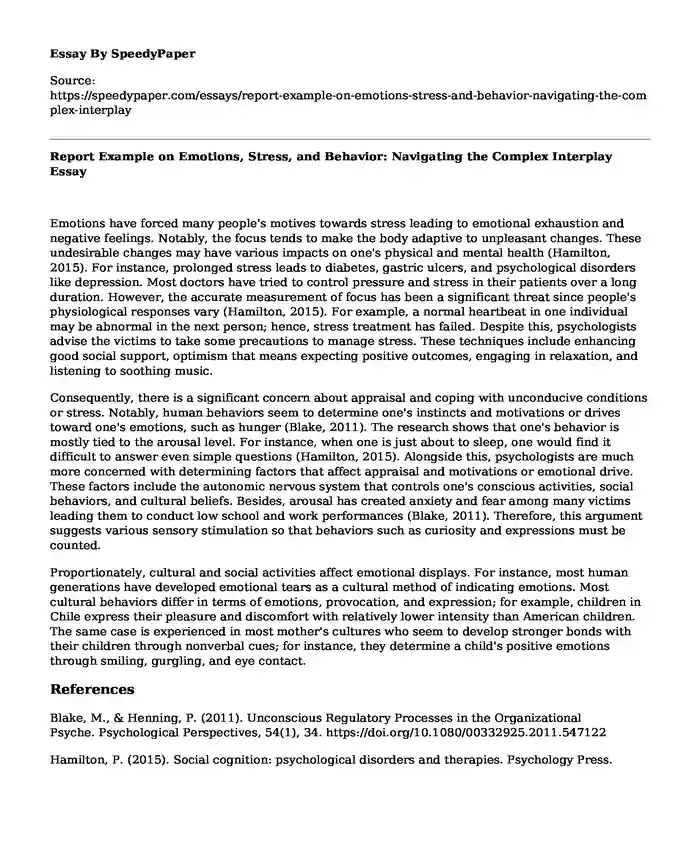
| Type of paper: | Essay |
| Categories: | Health and Social Care Motivation Stress Emotional intelligence |
| Pages: | 2 |
| Wordcount: | 400 words |
Emotions have forced many people's motives towards stress leading to emotional exhaustion and negative feelings. Notably, the focus tends to make the body adaptive to unpleasant changes. These undesirable changes may have various impacts on one's physical and mental health (Hamilton, 2015). For instance, prolonged stress leads to diabetes, gastric ulcers, and psychological disorders like depression. Most doctors have tried to control pressure and stress in their patients over a long duration. However, the accurate measurement of focus has been a significant threat since people's physiological responses vary (Hamilton, 2015). For example, a normal heartbeat in one individual may be abnormal in the next person; hence, stress treatment has failed. Despite this, psychologists advise the victims to take some precautions to manage stress. These techniques include enhancing good social support, optimism that means expecting positive outcomes, engaging in relaxation, and listening to soothing music.
Consequently, there is a significant concern about appraisal and coping with unconducive conditions or stress. Notably, human behaviors seem to determine one's instincts and motivations or drives toward one's emotions, such as hunger (Blake, 2011). The research shows that one's behavior is mostly tied to the arousal level. For instance, when one is just about to sleep, one would find it difficult to answer even simple questions (Hamilton, 2015). Alongside this, psychologists are much more concerned with determining factors that affect appraisal and motivations or emotional drive. These factors include the autonomic nervous system that controls one's conscious activities, social behaviors, and cultural beliefs. Besides, arousal has created anxiety and fear among many victims leading them to conduct low school and work performances (Blake, 2011). Therefore, this argument suggests various sensory stimulation so that behaviors such as curiosity and expressions must be counted.
Proportionately, cultural and social activities affect emotional displays. For instance, most human generations have developed emotional tears as a cultural method of indicating emotions. Most cultural behaviors differ in terms of emotions, provocation, and expression; for example, children in Chile express their pleasure and discomfort with relatively lower intensity than American children. The same case is experienced in most mother's cultures who seem to develop stronger bonds with their children through nonverbal cues; for instance, they determine a child's positive emotions through smiling, gurgling, and eye contact.
References
Blake, M., & Henning, P. (2011). Unconscious Regulatory Processes in the Organizational Psyche. Psychological Perspectives, 54(1), 34. https://doi.org/10.1080/00332925.2011.547122
Hamilton, P. (2015). Social cognition: psychological disorders and therapies. Psychology Press.
Cite this page
Report Example on Emotions, Stress, and Behavior: Navigating the Complex Interplay. (2023, Dec 04). Retrieved from https://speedypaper.net/essays/report-example-on-emotions-stress-and-behavior-navigating-the-complex-interplay
Request Removal
If you are the original author of this essay and no longer wish to have it published on the SpeedyPaper website, please click below to request its removal:
- Discussion Essay Sample on Animal-testing in Health Research
- Essay Sample on Health Maximization: Free Sample to Check
- Free Essay Dedicated to Changing Eating Habits
- Essay Example on Homeland Security: Preventing and Protecting Against Terrorist Attacks
- Essay Sample on Impacts of Coronavirus on Airline Industries
- Color Discrimination: A Loss of Hope for African American Youths - Essay Sample
- Wearing of Masks in Wisconsin - Essay Sample
Popular categories




